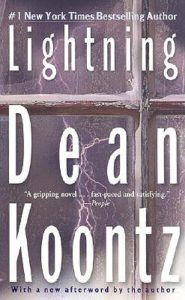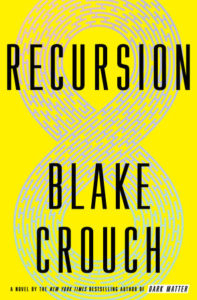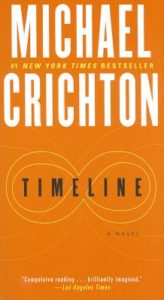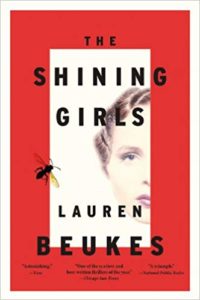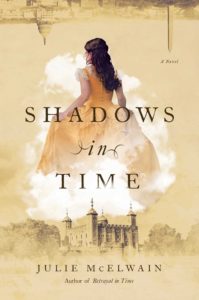H.G. Wells was not the first author to explore time travel as a literary device, but he popularized the concept in ways that had never been done before. I’ve always been drawn to time travel in all genres—from sci-fi to suspense, from romance to action adventure—but my particular favorite is mixing the time-bending element with a good mystery.
Depending upon how it’s done, it can add to the tension—a race against time as our characters try to return to their own era—or it can allow readers to explore the past through modern eyes. In my own In Time mystery series, I’ve enjoyed the fish-out-of-water sensation that my main character—a modern-day woman and brilliant FBI agent—experiences after being tossed back to the Regency period in England. As women then were second-class citizens without the ability to even vote, not only does she have to deal with personal obstacles, but she also cannot tap into her usual arsenal of forensic tools to solve crimes.
Whether time travel is being used to wrap a mystery in an extra, innovative layer or is allowing readers to view humanity and history through a different lens, the theme is brilliantly done in the books that I’ve listed below.
Lightning, Dean Koontz
The moment I read Lightning, I fell in love with the characters and the story’s complexity, so I was shocked to later learn that Dean Koontz actually had to fight to get this book published. I was not shocked that after he finally succeeded, the novel was wildly successful. From the first page, I was plunged into a not-so-natural phenomenon of flashing lightning in the middle of a snowstorm, from which a mystery man emerges and becomes inexplicably linked to the life of the main character, Laura. In typical Koontz fashion, Lightning weaves together a plethora of elements—heroism, heartbreak, love, humor, and plenty of bad guys. The time-travel aspect is lightly done, but with a twist that literally leaves you gasping.
Recursion, Blake Crouch
I didn’t think I could go down a more twisted rabbit hole than when I read Blake Crouch’s Dark Matter, but he simply blew my mind with Recursion. Time travel is often portrayed as an external process, relying on Albert Einstein’s theory of relativity, which teased the notion that space and time could be bent to create a wormhole or vortex. Crouch, however, went inward, by proposing the possibility that we could use our own memories to be propelled back to any point in our lives. The concept is fascinating, and there were many points at which I had to put down the book to simply think about what I had just read. Of course, in Crouch’s tale there is as much danger and devastation in going back to tweak your own timeline as there is if you were to jump into a time machine and return to the days of the dinosaurs, stepping on an insect that would then change life as we know it (à la Chaos Theory and the Butterfly Effect).
Timeline, Michael Crichton
No one has ever blended science—both fact and theory—into action adventure quite like Michael Crichton. He delves into the mechanics of time travel in such a masterful way that the incomprehensible becomes a head-nodding moment. Even better, it doesn’t slow down the story, which begins as a puzzle and evolves into an escapade, when a modern-day professor is trapped in the Middle Ages, with his band of scientifically minded students following to rescue him. I loved learning about the history of this particular time, especially seen through the eyes of scientists. Of course, human nature remains consistent through the centuries, which means there is plenty of avarice, betrayal, and cruelty to keep readers white-knuckled with worry over whether our protagonists will escape with their lives.
The Shining Girls, by Lauren Beukes
Serial killers often escape detection by jumping jurisdictions, both in real life and in fiction. Lauren Beukes takes this to a mind-bending extreme by having a delusional psychopath jumping decades—from the Great Depression to the early ’90s—after discovering a house that is a time-traveling portal. When a woman survives her vicious attack, she becomes obsessed about finding her would-be murderer, and the puzzle pieces begin to slowly snap together. The writing is beautiful, the crimes brutal. This is not a book for the faint of heart, but if you have the courage, it’s well worth the read.
11/22/63, by Stephen King
Traveling back in time with the purpose of changing history—and therefore the future—is an idea that has been explored in movies, TV (the old Twilight Zone had a few thought-provoking episodes on the subject), literature, philosophical discussions, and even in science classes. Yet Stephen King boldly—and brilliantly—explored the concept with perhaps the biggest do-over of all time with our main character, Jake (aka George), trying to stop Lee Harvey Oswald from assassinating John F. Kennedy.
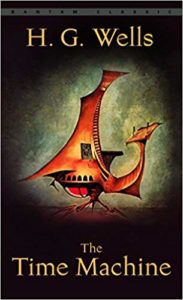
The Time Machine, by H.G. Wells
It’s impossible to do a list of time-travel books without including the granddaddy of them all, The Time Machine. Written in 1895, Wells imagined the future—802701 A.D., to be precise—when his Time Traveler narrator recounted his journey there (and beyond). I had read The Time Machine years ago, but I thought I needed to reread the novella again before officially including it in this list. While I had fond memories of the story, I also have fond memories of The A-Team. Not everything stands the test of time (no pun intended). Thankfully, The Time Machine is worth the read and reread. Wells’ Time Traveler recounts his journey into the future, where human beings have undergone a Darwinian evolution—or, rather, a devolution, since humanity does not fare well. Even though it was written in the Victorian Age, it is a cautionary tale that will resonate for today’s reader, too.
*


